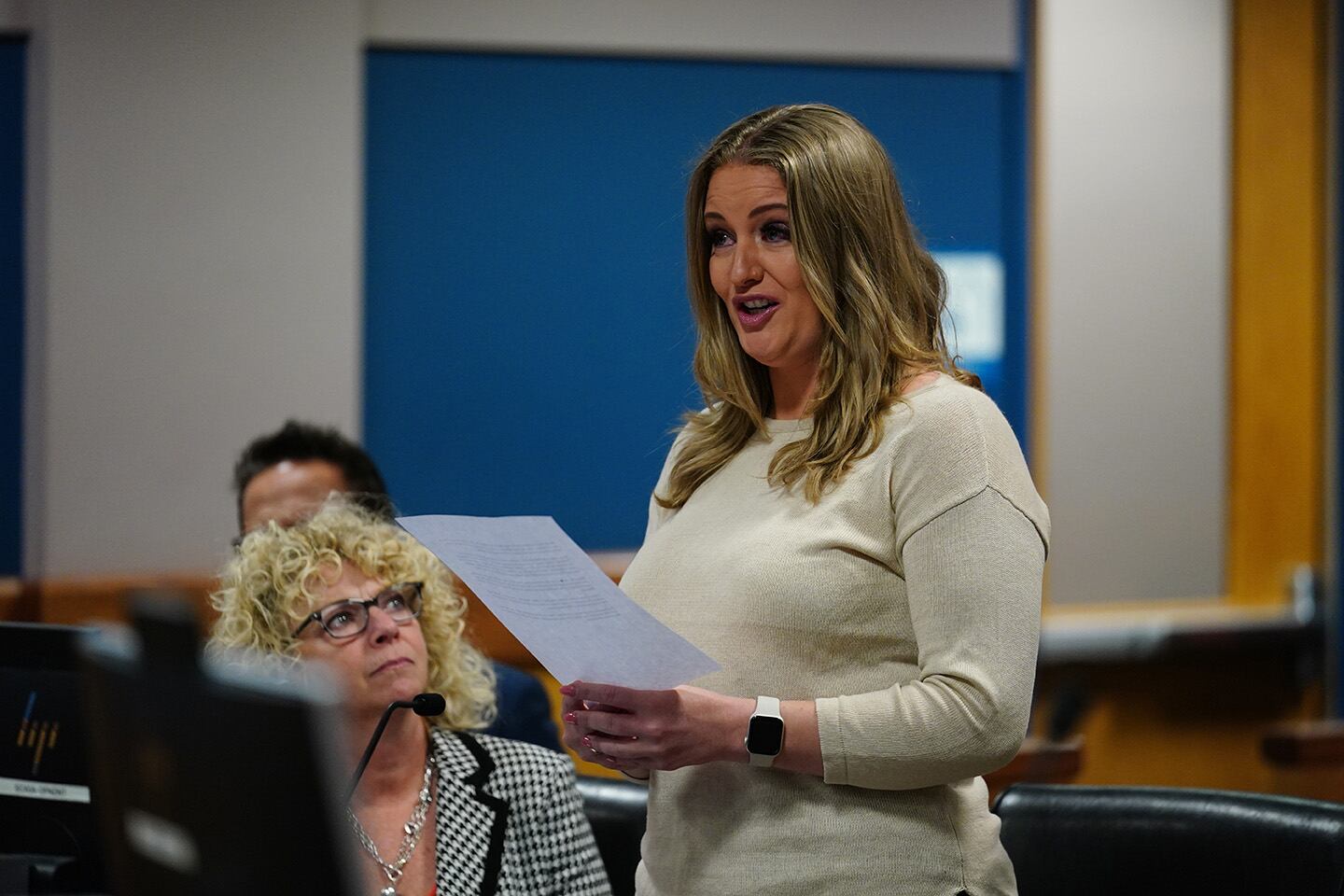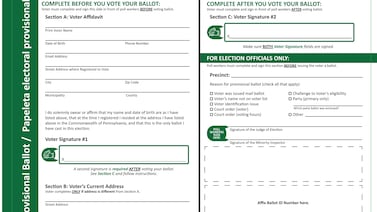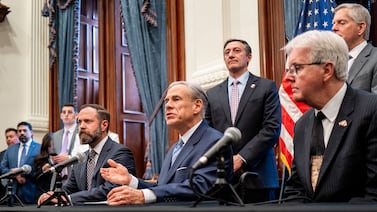Votebeat is a nonprofit news organization reporting on voting access and election administration across the U.S. A version of this post was originally distributed in Votebeat’s free weekly newsletter. Sign up to get it delivered to your inbox every Saturday.
Good morning,
After lawyer Sidney Powell pleaded guilty to charges in Fulton County, the headlines and opinion columnists said it was bad news for former President Donald Trump and an acknowledgement that the conspiracy theories about the 2020 elections were baseless.
And Powell’s guilty plea is one of several. Trump lawyers Kenneth Chesebro and Jenna Ellis also took deals recently and agreed to testify against co-defendants, a long list that includes Trump. News reports noted at least some of those taking pleas submitted videotaped accounts of what they would say against the remaining defendants if put on the stand. Chesebro and Ellis, unlike Powell, both pleaded guilty to felonies, though the deals for all three call for probation rather than jail time.
Ellis tearfully said she felt “deep remorse” for the false information she pushed on the public, claiming she had relied on assurances from other, more experienced lawyers. Maybe. She had previously acknowledged making misrepresentations about the 2020 election in a sworn statement connected to bar disciplinary proceedings in Colorado, though the Washington Post correctly notes she later suggested she had cut a deal under pressure to settle the case.
A guilty plea and an admission in open court that her claims were false could be harder to explain away. Nonetheless, some social media commenters dismissively said Powell, Ellis, and others pleading guilty would be silly not to take themselves out of legal jeopardy by accepting a deal that carries no jail time, and it’s fair to say the plea deals are light. After all, Crystal Mason, the Texas woman who said she voted in 2016 because she didn’t know she was ineligible to do so, was sentenced to five years in prison for it — a much stiffer sentence for, arguably, something that did far less damage.
But it’s clear that even if people like Ellis acknowledge they made claims completely unsupported by actual facts, people will still believe the lie. It’s not clear what’s going to change that, and the lies are still shaping events.
For example, take the mess over on the House side of the U.S. Capitol, where the Republican majority ousted House Speaker Kevin McCarthy, then spent basically three weeks of precious floor time, as wars rage overseas and the federal government nears a shutdown, attempting to select a replacement.
The fractious backbiting over there went on for so long, through so many failed candidates, it took basically as long as the baseball playoffs, which is saying something because those teams have to win the majority of a seven-game series and a House speaker (technically) doesn’t.
One candidate, House Majority Whip Tom Emmer of Minnesota, was the speaker designate for a few hours Tuesday, the same day Ellis choked up in court, but couldn’t get the votes.
Why not? Rep. Marjorie Taylor Greene of Georgia told reporters some members wouldn’t vote for Emmer because he voted to certify the 2020 election - even though people are pleading guilty to crimes while acknowledging their allegations of election fraud were baseless.
By Wednesday morning, House Republicans had turned to their next speaker candidate, Rep. Mike Johnson of Louisiana, whom the New York Times has described as “the most important architect of the Electoral College objections.”
That’s apparently a key credential for the job that’s third in line for the presidency, because Johnson got the votes.
Asked whether the plea deals will change the minds of Americans who believe the results of the 2020 election were somehow tampered with, David Becker, the head of the Center for Election Innovation & Research and a voting rights lawyer, acknowledged it won’t be that easy for the truth to penetrate.
“The people who have been sending $25 of their Social Security check to grifters for three years, those people are legitimate victims, and I don’t think this is going to change overnight,” he said. “It’s going to take a long, long time.”
Nonetheless, he said, the prosecutions and guilty pleas “are an important first step” that, over time, “disincentivize the leaders of these grifting movements.” Eventually, he said, that could allow us all “to agree on a common reality, especially one as important as: Elections have meaning, and the winners win.”
“And,” he added, “we know who won elections.”
Back Then
We’re offering you recent history this week: a collection of stories about newly elected House Speaker Mike Johnson’s efforts to stop certification of the 2020 presidential election. The Associated Press, the Washington Post, the New York Times, NBC News, and Politico all highlighted his efforts.
New From Votebeat
From Votebeat Arizona: Fixes may be coming for 4 of Arizona’s election controversies prior to the presidential election
From Votebeat Michigan: Michigan Appeals Court rules that secretary of state improperly set limits for poll challengers
From Votebeat Michigan: Some communities are kicking off Michigan’s historic early voting with this fall’s municipal elections
From Votebeat Pennsylvania: Pennsylvania’s voting law is filled with obsolete provisions, troublesome conflicts
From Votebeat Texas: Harris County’s voter roll errors — if left unexplained — could fuel claims of voter fraud
In Other Voting News
- A federal judge struck down Georgia’s political maps, finding they violated the Voting Rights Act by discriminating against Black voters, the Atlanta Journal-Constitution reported. The judge ordered the Republican-controlled Legislature to create an additional majority-Black congressional district, as well as two more state Senate and five state House districts with Black majorities. Separately, in North Carolina, lawmakers passed new maps that heavily favor Republicans.
- A data breach may have exposed personal information, including Social Security numbers, about every voter in Washington, D.C., WTOP reported, and election officials plan to reach out to voters and are working with cybersecurity experts.
- A Georgia trial will determine whether hundreds of thousands of challenges to Georgia voters’ eligibility backed by conservative nonprofit True the Vote were meant to discourage voters from casting ballots, the New York Times reported.
- The percentage of provisional ballots rejected in Ohio skyrocketed during August’s special election, the first under a new law requiring voter identification, the Statehouse News Bureau reported.
Carrie Levine is Votebeat’s story editor and is based in Washington, D.C. She edits and frequently writes Votebeat’s national newsletter.Contact Carrie at clevine@votebeat.org.







